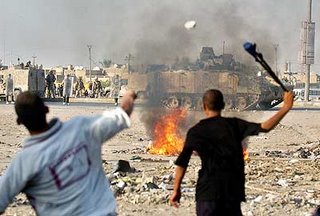 The Iraqi tyranny has been deposed and that indeed is a noble deed. However, it has been replaced by Iraqi anarchy and civil war as a result of corruption and incompetence of the leadership of the liberating forces. For that we, and the people of the Middle East, will suffer for years to come. We have become less secure and their society is plunged into chaos.
The Iraqi tyranny has been deposed and that indeed is a noble deed. However, it has been replaced by Iraqi anarchy and civil war as a result of corruption and incompetence of the leadership of the liberating forces. For that we, and the people of the Middle East, will suffer for years to come. We have become less secure and their society is plunged into chaos.Timothy Garton Ash offers these thoughts in today’s Guradian:
'They died in vain." Four words that are unbearable for the mother of a dead soldier and shaming for the politicians who sent them to their deaths. So our leaders say "they did not die in vain". But who now believes them?
Contemplating the scale of the American-British failure in Iraq, I have been struggling to see if there are any future circumstances, any lines of long-term strategic action, which would one day enable us honestly and credibly to say to the mother of a soldier who died in Iraq: "Your son did not die in vain." At the moment, that seems nearly impossible.
Yes, our troops removed a very nasty tyranny, to widespread initial rejoicing among the people of Iraq. For some Iraqis - especially Kurds and Shia - some things about their lives have got better. People who were in prison or in exile are now at home. Millions of Iraqis turned out to vote for political parties of their choice, despite intimidation. They have incomparably more free media than before and less reason to fear repression from the central state. A few have prospered. In places, the occupying powers have done major reconstruction work. But that's about all one can say on the plus side; the minus list is so much longer.
As Patrick Cockburn, a writer with rare in-depth knowledge of Iraq, chronicles in his new book The Occupation, the dimensions of our failure over more than 40 months of occupation are breathtaking. It starts with the most basic services. Despite the expenditure of hundreds of billions of dollars, US government witnesses told the Senate foreign relations committee earlier this year that the performance of the Iraqi electricity, water, sewage and oil sectors is still below pre-invasion levels. The economy is worse in many respects than it was before. Instead of going in fear of Saddam's secret police and torturers, people go in fear of gangs, militias, criminals and fanatics.
To exchange tyranny for anarchy is merely to move from one circle of hell to another. As one Iraqi recently commented: under Saddam we had a state, a bad state, but to have no state is even worse. Even if the Johns Hopkins University estimate of some 600,000 Iraqi civilian deaths since the invasion is an overestimate, extrapolating from too small a sample, the number of Iraqi civilian deaths is horrendous. The country is already in civil war. As foreign troops leave, that's almost certain to get worse before it perhaps - but only perhaps - gets better, if Shia, Kurd and Sunni leaders, and their foreign patrons, can hammer out a compromise based on a more or less disintegrated confederal state. And that's only the story inside Iraq. In the world at large, the balance-sheet is even worse. An intervention that was intended to make the world safer for democracy has made the world more dangerous for all democracies. The United States' own recently released National Intelligence Estimate confirmed that Iraq has become a "cause celebre" for terrorists. It has infuriated Muslims in our own countries, including the London bombers of July 7. By distracting forces and attention from our original, legitimate mission to extirpate al-Qaida's bases in Afghanistan, it has allowed the Taliban to regroup and come back in force there. It has turned a militant, Islamist Iran into a regional winner, increasing the likelihood that it will try to develop nuclear weapons. It has made the United States more unpopular around the world than at any time since reliable polling began and dramatically decreased the United
States' capacity to get its way. North Korea, for example, cocks a nuclear snook at Washington. So much for "the world's only hyperpower".
… Can we accept that this "war" against terrorism, like the cold war, will never be won by military means? Do we have the confidence to engage diplomatically with everyone in the region, including Iran and Syria, beginning a regional security negotiation comparable to the Helsinki process in 1970s Europe? Can we - working with Arab and Iranian dissidents and intellectuals - craft policies of "offensive detente" towards both the states and societies of the Muslim world and sustain those policies over a generation? Or will the United States simply cut and run, retreating into its own vast carelessness (to adapt a memorable phrase from Scott Fitzgerald), and, under its next president, adopt a new, unhappy mixture of isolationism and so-called realism? If the former, we may yet, in decades to come, have available some honest words of comfort to the still grieving mother. If the latter, there will be no honest consolation.
1 comment:
Found a great article called Defining the War on Terrorism and America that calls into question all the crap we see on the news.
Post a Comment